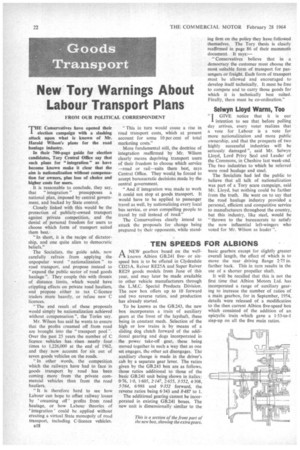New Tory Warnings About Labour Transport Plans
Page 24

If you've noticed an error in this article please click here to report it so we can fix it.
FROM OUR POLITICAL CORRESPONDENT
THE Conservatives have opened their I. election campaign with a slashing attack upon what is known of Mr. Harold Wilson's plans for the road haulage industry.
In their 700-page guide for election candidates, Tory Central Office say that such plans for "integration" as have become known make it clear that the aim is nationalization without compensation for owners, plus loss of choice and higher costs for users.
It is reasonable to conclude, they say, that " integration " presupposes a national plan, imposed by central government, and backed by State control.
Closely linked with this would be the protection of publicly-owned transport against private competition, and the denial of personal freedom for users to choose which form of transport suited them best.
" In short, it is the recipe of dictatorship, and one quite alien to democratic beliefs."
The Socialists, the guide adds, now carefully refrain from applying the unpopular word " nationalization " to road transport, and propose instead to "expand the public sector of road goods haulage". They couple this with threats of distance limits, which would have crippling effects on private road hauliers, and propose either to tax C-licence traders more heavily, or refuse new C licences.
"The end result of these proposals would simply be nationalization achieved without compensation ", the Tories say.
Mr. Wilson has said he wants to ensure that the profits creamed off from road are brought into the "transport pool ". Over the past 25 years the number of C licence vehicles has risen nearly four times to 1,226,000 at the end of 1962, and they now account for six out of seven goods vehicles on the roads.
"In other words, the competition which the railways have had to face in goods transport by road has been coming more from the private commercial vehicles than from the road ha uliers.
"It is therefore hard to see how Labour can hope to offset railway losses by creaming off' profits from road haulage, or how Labour theories of ' integration ' could be applied without creating a virtual State monopoly of road transport, including C-licence vehicles.
B18
"This in turn would cause a rise in road transport costs, which at present account for some 10 per cent of total marketing costs."
More fundamental still, the doctrine of integration reaffirmed by Mr. Wilson clearly means depriving transport users of their freedom to choose which service —road or rail—suits them best, says Central Office. They would be forced to accept bureaucratic decisions made by the central government.
"And if integration was made to work it could not stop at goods transport. It would have to be applied to passenger travel as well, by nationalizing every local bus service, or even compelling people to travel by rail instead of road."
The Conservatives clearly intend to attack the proposals for change being prepared by their opponents, while stand ing firm on the policy they have followed themselves, The Tory thesis is clearly reaffirmed in page 86 of their mammoth document. It says:— " Conservatives believe that in a democracy the customer must choose the most suitable form of transport for passengers or freight. Each form of transport must be allowed and encouraged to develop itself technically. It must be free to compete and to carry those goods for which it is technically best suited. Finally, there must be co-ordination."
Selwyn Lloyd Warns, Too
"
I GIVE notice that it is our
intention to see that before polling day arrives, every voter realizes that a vote for Labour is a vote for more nationalization and more public ownership, and that the prospects of two highly successful industries will be seriously damaged ", said Mr. Selwyn Lloyd, Lord Privy Seal and Leader of the Commons, in Cheshire last week-end. The two industries to which he referred were road haulage and steel.
The Socialists had led the public to believe that all talk of nationalization was part of a Tory scare campaign, said Mr. Lloyd, but nothing could be farther from the truth. He went on to say that the road haulage industry provided a personal, efficient and competitive service to manufacturers throughout the country, but this industry, like steel, would be "thrown to the bureaucrats to satisfy The now influential left-wingers who voted for Mr. Wilson as leader ".












































































































